FORT POLK, La. -- Two Patriot Brigade battalions recently teamed to conduct annual certification testing and medical training for their combat medics.
Staff Sgt. James Depree, 2nd Battalion, 4th Infantry Regiment medical platoon sergeant, and Staff Sgt. Stephen Bonanni, 5th Battalion, 25th Field Artillery Regiment medical platoon sergeant, came up with the idea of certifying their medics together.
Trauma lane training at Castor 1 training area recertified medics for their "Emergency Medical Technician Basic" civilian licensing and earned them continuing education units to maintain their status as military medics, explained Depree. Medics also ran the Yarborough Mile and conducted medical training at Fort Polk's A,A1/4 mile track to build esprit de corps and make training more fun and challenging, he said.
"We coordinated so that 2-4 (Inf Reg) and 5-25 (FA Reg) could conduct training (together) and get both of our units certified," said Depree. "(His unit) could grade our Soldiers and we could grade his Soldiers so that we both have a good idea of where our Soldiers (stood)."
To pass their certification testing, medics had to complete one of two trauma lanes at Castor 1. The lanes were identical at the starting point, but scenarios continually changed as medics performed medical interventions. All the while, Depree and Bonanni rapidly barked instructions and created a stress-filled environment.
"They are really going to be thinking while they are out there," Depree said before lane training began. "If they fail a station or fail to do an intervention, we will bring them back, retrain them, explain what they did wrong (and) how to fix it; and then they will go back on the lane a little bit later to retest."
After receiving a safety brief, medics had a couple of minutes to double check their aid bags to ensure they had everything needed to successfully negotiate the lanes. Depree and Bonanni explained the scenarios to two medics at a time, who then had to choose safe routes under "enemy fire" to their screaming patients lying somewhere in thick woods about 75 to 100 meters away.
Then they came upon two casualties: a dummy, on which medics performed interventions such as basic CPR and patient assessment, and one live Soldier -- complete with moulage to simulate injuries.
"We want to put as many stressors on them as we can so their bodies begin to think and (to) get that muscle memory going," said Depree. "Too often, you get in a clinical setting or are back in garrison and not training like you want to, so your body starts to forget how taxed and stressed it can actually be. So that's what we are going to do here: stress them out. By the time they get (done), they are going to know that they did a good chunk of (physical training). They will physically understand the effort of taking care of a casualty and getting them to a place where they can be (evacuated) out. We are going to put them through the wringer today."
Even if an individual knows how to perform interventions properly, working on a simulated casualty under added pressure of a trauma lane can be difficult, Bonanni said. It's all about muscle memory and repetition.
"As soon as you get out there and someone starts yelling at you and you see blood and you have to reach in your aid bag and you are sweating, it is a completely different situation," said Bonanni. "You have to do it over and over again. When you don't have a chance to do it over and over again, you'll remember eventually, but it is not good to draw blanks; and people will draw blanks."
Two medics who didn't draw many blanks during the trauma-lane certifications are Pfc. Terry Trinkella, Headquarters and Headquarters Battery, 5-25 FA Reg, and Pfc. Dani Baker, Headquarters and Headquarters Company, 2-4 Inf Reg. Both Soldiers said they knew everything they needed to recertify and performed pretty well, but it was still a difficult challenge.
"It really tests your skill of what you know with medications (and) muscular endurance, and so it is a full-body workout, not just the muscles," Trinkella said. "It really makes you think back through all of the training that you have gotten from day one.
"When I was going through (medic school) training it was just 'this is what is going on (and) this is what you are supposed to do.' Here, it was changing every 30 seconds. It was tough, that is all I have to say."
Baker, who recently returned from Iraq, said the trauma lane was hard and tiring, but he was prepared. Although one cannot perfectly simulate what combat medics realistically go through while deployed, Depree and Bonanni came as close as possible, he said.
"I think it came pretty close, at least to hit up on the (medical and survival) skills (we use while deployed)," said Baker. "They are open to teach you anything, as long as you are willing to learn, and they all have ample combat experience. So they have a lot to pass on, actual realistic scenarios to throw at you."
Baker and Trinkella said they were able to handle the stress well. Even with time ticking, instructors yelling and medical interns observing, they could concentrate on the casualties.
"I was aware (of a medical student observing) for the first couple of minutes, but then I didn't even realize (they were there)," said Trinkella. "I just zoned them out, because they are just like trees standing in the background."
Baker separated noise from vital information and focused on his patient, too. He compared the distractions and unnecessary commentary to that of a well-known comic strip.
"It kind of sounds like Charlie Brown's teacher; 'Waah, waah, waah; waah, waah, waah, waah.' You just zone it out, and you learn to pick up on the things that you need to hear," Baker said. "If they are yelling out, 'OK, blood pressure 120 over 80,' you (say to yourself), 'Alright, I heard that.' But you tune out the yelling and everything and just focus on your patient, because that is why you are there."
The observing interns are second year medical students at Uniformed Services University who might become brigade surgeons or line doctors after graduating. They said they were extremely impressed with the combat medics and the training.
"These guys seem to know what they are doing," said medical student 2nd Lt. Christian Leicham. "It is hard when people are yelling at you and people are shooting at you, but they are handling the stress well, and they are doing a good job."
Depree said medical training needs to become a priority across the board. He appreciates the tremendous support of leaders in the chain of command, from brigade to battalion, for this type of training. After all, Soldiers' lives are at stake.
"With or without a provider on the ground, we are the first line of defense for our Soldiers when they get hurt," Depree said. "The bottom line is that we want to have the confidence to save and sustain life and move them to a higher echelon of care."
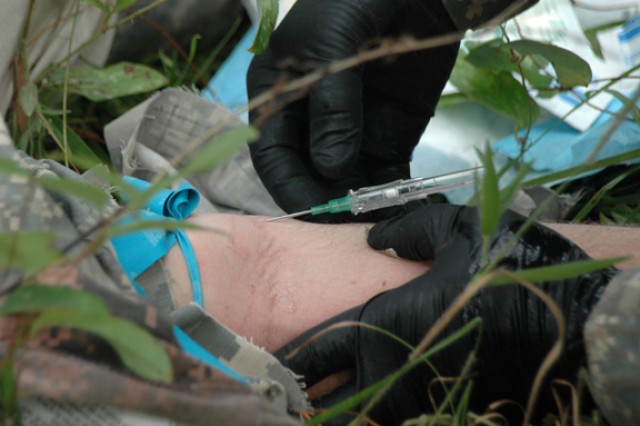
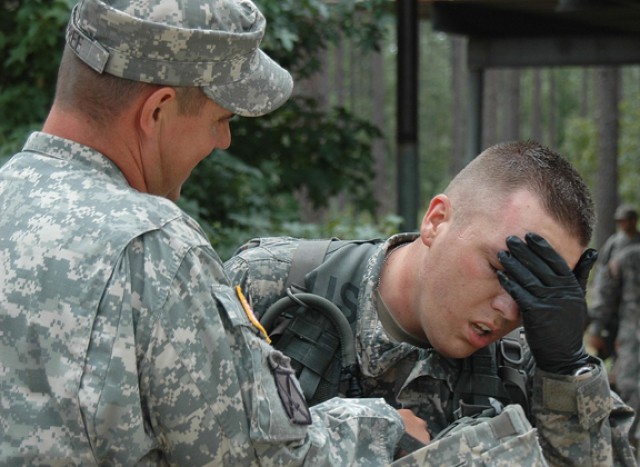
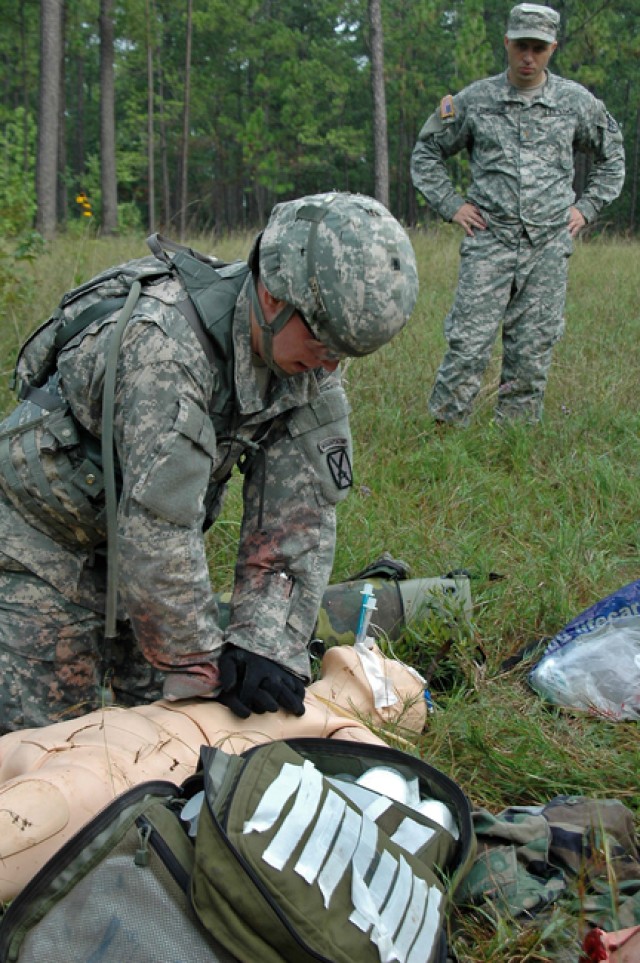
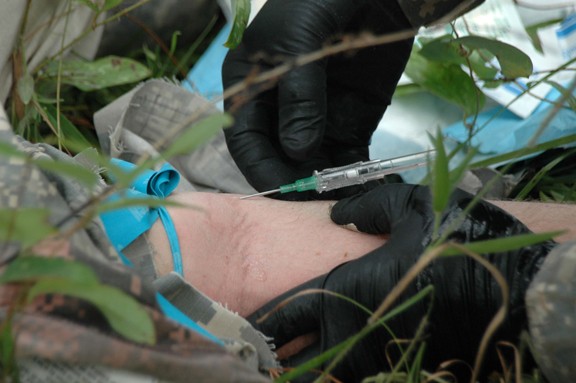
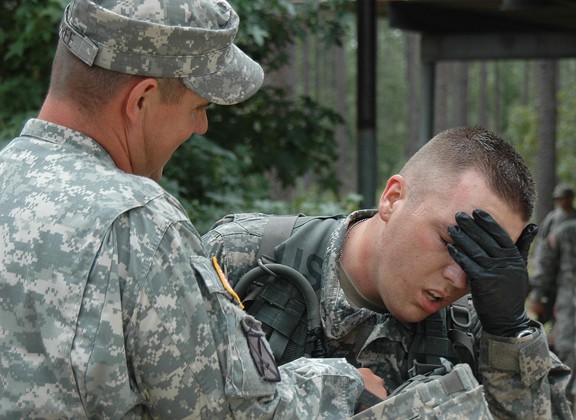
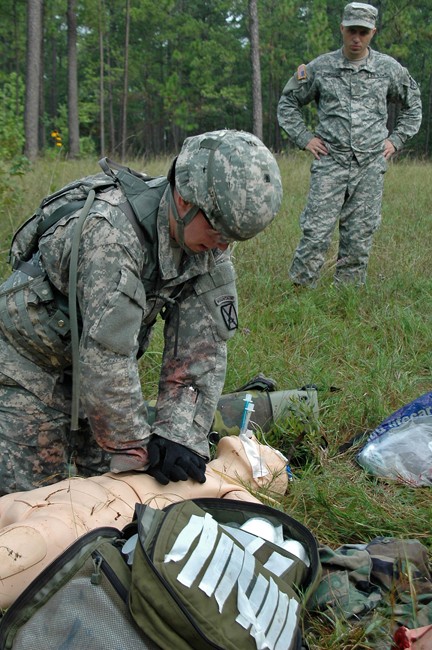
Social Sharing